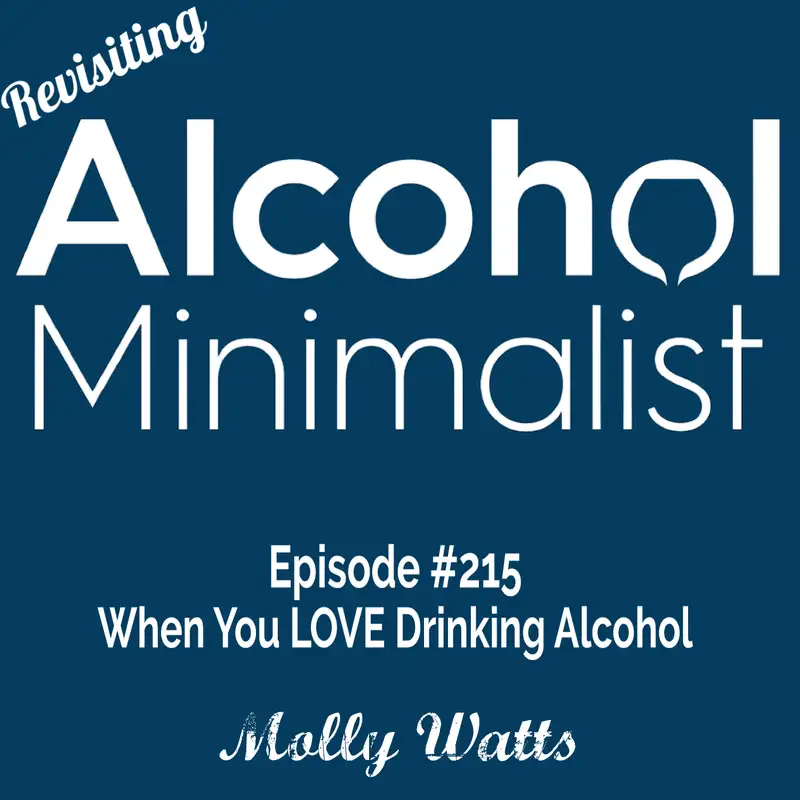Revisiting: When You LOVE Drinking Alcohol
Episode Summary:
In this episode, host Molly Watts revisits a key discussion from 2022, exploring the challenge of changing your relationship with alcohol when you genuinely enjoy drinking. Molly shares insights on how to shift your habits without guilt, deprivation, or an all-or-nothing mindset. She discusses four key strategies for breaking the cycle of daily drinking while still being able to enjoy alcohol in moderation.
Molly also reflects on the launch of Step One, a foundational program that is now an integral part of Making Peace with Alcohol. She recounts her own journey of overcoming a long-standing daily drinking habit and provides actionable tips for listeners who want to redefine their drinking patterns.
Whether you're struggling with the idea of drinking less or simply looking for ways to be more intentional about your alcohol consumption, this episode is packed with science-backed strategies and real-life wisdom to help you on your journey.
Key Topics Covered:
✔️ The mindset shift required to change your drinking without feeling deprived
✔️ Why the "I just love to drink" thought keeps you stuck
✔️ How to reframe your beliefs about alcohol without relying on fear-based messaging
✔️ Understanding the science behind habit formation and alcohol consumption
✔️ Four key actions you can take to create a more peaceful relationship with alcohol
✔️ Why the "I just love to drink" thought keeps you stuck
✔️ How to reframe your beliefs about alcohol without relying on fear-based messaging
✔️ Understanding the science behind habit formation and alcohol consumption
✔️ Four key actions you can take to create a more peaceful relationship with alcohol
Mentioned in This Episode:
🔹 Making Peace with Alcohol – Molly’s 12-month group coaching program
🔹 Step One – A self-paced online course that helps you build healthier drinking habits
🔹 William Porter’s perspective on alcohol and why Molly takes a different approach
🔹 The power of cognitive behavioral strategies in changing your drinking patterns
🔹 Step One – A self-paced online course that helps you build healthier drinking habits
🔹 William Porter’s perspective on alcohol and why Molly takes a different approach
🔹 The power of cognitive behavioral strategies in changing your drinking patterns
Resources & Links:
🔗 Learn more about Making Peace with Alcohol: Visit Here
🔗 Join the Alcohol Minimalist Facebook Community: Join Here
🔗 Follow Molly on Instagram: @alcoholminimalist
🔗 Subscribe to the Podcast: Apple Podcasts | Spotify | Other Platforms
🔗 Join the Alcohol Minimalist Facebook Community: Join Here
🔗 Follow Molly on Instagram: @alcoholminimalist
🔗 Subscribe to the Podcast: Apple Podcasts | Spotify | Other Platforms
Episode Takeaway:
Changing your drinking habits doesn’t mean giving up alcohol completely. It means learning how to be in control, so alcohol is no longer in control of you.
👉 If you found this episode helpful, please subscribe and leave a review!
Low risk drinking guidelines from the NIAAA:
Low risk drinking guidelines from the NIAAA:
Healthy men under 65:
No more than 4 drinks in one day and no more than 14 drinks per week.
Healthy women (all ages) and healthy men 65 and older:
No more than 3 drinks in one day and no more than 7 drinks per week.
No more than 3 drinks in one day and no more than 7 drinks per week.
One drink is defined as 12 ounces of beer, 5 ounces of wine, or 1.5 ounces of 80-proof liquor. So remember that a mixed drink or full glass of wine are probably more than one drink.
Abstinence from alcohol
Abstinence from alcohol is the best choice for people who take medication(s) that interact with alcohol, have health conditions that could be exacerbated by alcohol (e.g. liver disease), are pregnant or may become pregnant or have had a problem with alcohol or another substance in the past.
Abstinence from alcohol is the best choice for people who take medication(s) that interact with alcohol, have health conditions that could be exacerbated by alcohol (e.g. liver disease), are pregnant or may become pregnant or have had a problem with alcohol or another substance in the past.
Benefits of “low-risk” drinking
Following these guidelines reduces the risk of health problems such as cancer, liver disease, reduced immunity, ulcers, sleep problems, complications of existing conditions, and more. It also reduces the risk of depression, social problems, and difficulties at school or work.
Following these guidelines reduces the risk of health problems such as cancer, liver disease, reduced immunity, ulcers, sleep problems, complications of existing conditions, and more. It also reduces the risk of depression, social problems, and difficulties at school or work.

